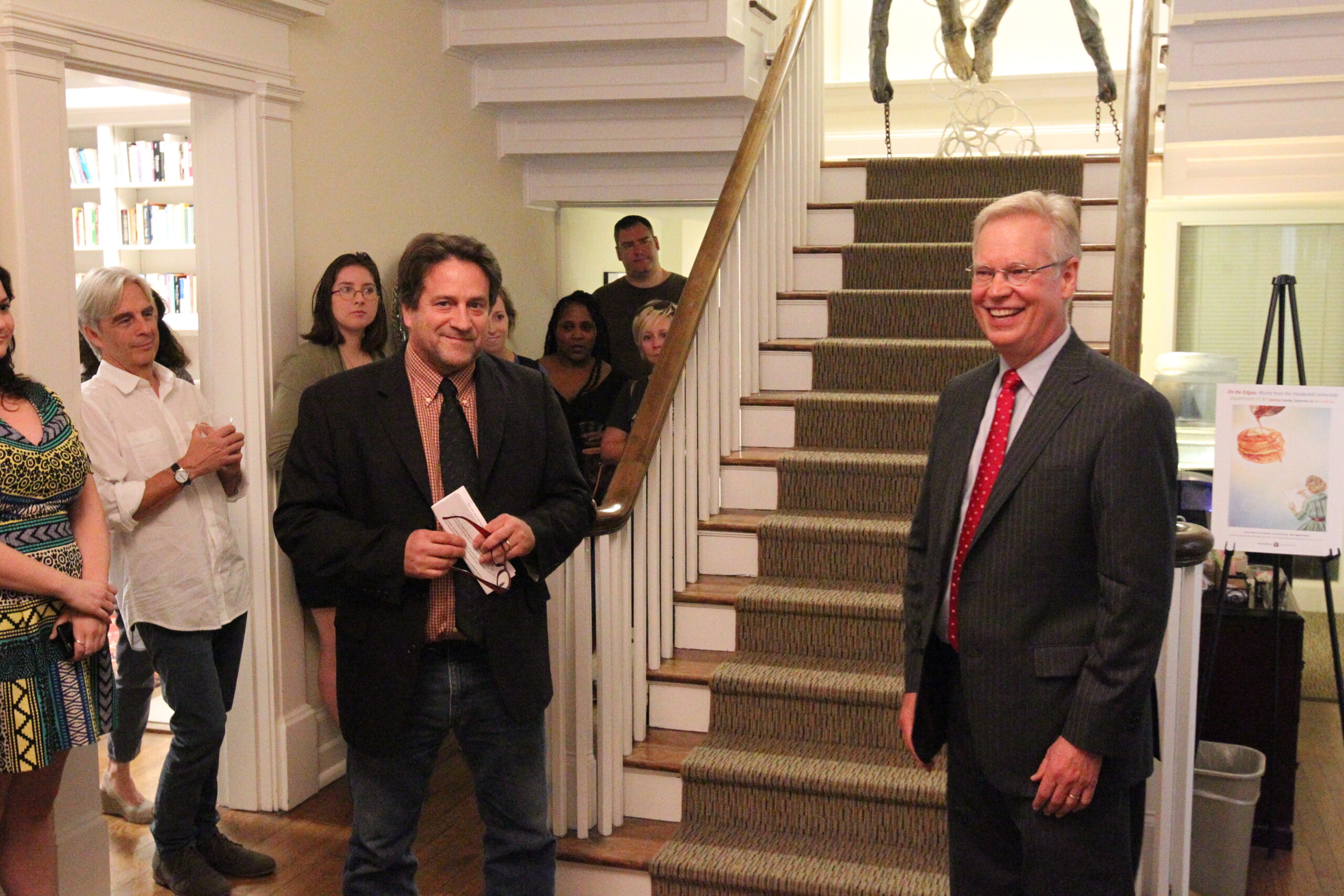Twenty Years of Understanding Genetics in Literature and Society
By Andy Flick, Evolutionary Studies scientific coordinator
Jay Clayton, William R. Kenan, Jr. Professor of English, first received funding from the National Institutes of Health to study genetics in literature, film and popular culture in 2003. According to the application, this first grant funded, “a working group of scholars in literature, film, and media studies to examine the representation of genetics in literary and popular culture.”

Illustrating a story for A&S Magazine where Jay Clayton says that he became interested in genetics in literature because of dinner conversation with his wife, Dr. Ellen Wright Clayton (she`s an MD,lawyer and works in genetics and health policy at VUMC). (Vanderbilt Photo / Daniel Dubois)
Twenty years later, it seems that Clayton has been extremely successful in developing a thorough understanding of this topic. In 2017, a group of researchers at Vanderbilt started the NIH-funded Genetic Privacy and Identity in Community Settings (GetPreCiSe).
According to Clayton, “this grant brought together a transdisciplinary working group at Vanderbilt to articulate best practices for genetic privacy in the age of big data.”
Understanding how society views genetics has long been of interest to Clayton. In 2007, he published a single-authored paper (“Victorian Chimeras, or, What Literature Can Contribute to Genetics Policy Today”) about the passing of guidelines from the Institute of Medicine regarding DNA splicing. He showed how H. G. Wells had predicted such scientific developments in 1896 and foreshadowed some of the ethical concerns. He noted how several people, speaking at the guideline-development meeting, referenced scientific fictions including centaurs, minotaurs, and mermaids.
Since the GetPreCiSe program started, Clayton has showcased his commitment to mentorship by working with dozens of trainees under the program’s umbrella.
According to Department of English chair, Jennifer Fay, “Clayton coordinates a research group varying in size between eight to twelve undergraduates, graduate students, and postdocs who work on multiple projects. Under Clayton’s mentorship, numerous graduate students and undergraduates in the humanities have published as first-authors peer-reviewed papers (totaling more than 20 published to date).”
His work looks in depth at single pieces, like the Orphan Black series, single genres, like medical dramas, and even all genres of movies and television over the past 100 years.
Much of Clayton’s work is in the field of genetic privacy and he uses movies like the Blade Runner series to illustrate and study the intricacies of privacy. Along with first author Kendra Oliver (Ph.D. ‘16) and co-author Stephanie Higgs (MA ‘10, Ph.D. ‘16), the team published an article titled, “The End of Genetic Privacy in the Blade Runner Canon.” The team found that the Blade Runner series portrays a potential future where private information is collected and exploited with little regard for personal privacy rights, reflecting real-world trends.
When asked about the negative depictions of genetics in film, Clayton said, “some of the scary ways genetic data are handled in Blade Runner 2049 are easy to imagine coming to pass in our own society. Both the government and private corporations maintain vast databases that correlate every person’s DNA with their health record, consumer habits, driver’s license, criminal record, political and religious views, and more. Of course, the movie also has many science fiction elements too, like human clones created for work in toxic environments and off-world slave colonies!”
Additionally, Clayton was the senior author on a research paper in early 2023 titled, “Autonomy and bioethics in fan responses to Orphan Black,” which was co-authored by undergraduate researchers Ayden Eilmus (first author, BA, ‘21) and Avery Bradley (BA, ‘23). The TV show, Orphan Black, has unique engagement with its fanbase which encouraged online responses and fan-generated content, offering a distinct perspective on the portrayal of science and bioethical implications in the series. The team found that fans of the show actively participated in the process of interpreting and contemplating bioethical aspects, revealing a dynamic connection between how science is depicted in media and how viewers interpret its implications in the real world.
Along with first-author Lauren Furman (BA, ‘20), Clayton published a piece titled, “Genetics in Television Medical Dramas.” This study looks at American medical dramas on primetime television, which have been popular since the 1950s. These shows have gradually incorporated genetics into their storyline, with a significant increase in the number of episodes involving genetics since 2010. The pair found medical dramas increasingly focus on helping their characters manage genetic conditions. More illnesses are being attributed to genetics which is enabling in-depth exploration of genetic nuances and shaping viewers’ understanding of these issues in healthcare and society.
Clayton then took the research one step further with graduate student Ethan Gibbons (Ph.D., ‘22) and undergraduate researcher Isaac Stovall (BA, ‘21) to 100 years of television and movies across genres. Clayton and Gibbons were featured in a video created by Vanderbilt University Communications and Marketing and a story from Evolutionary Studies about the changing views on genetics in film and television. See the story to learn more about how popular format entertainment has evolved its use and understanding of genetics.

Clayton recently published an open access book, “Literature, Science, and Public Policy: From Darwin to Genomics.” This book explores the role and changing voices of literature surrounding important scientific developments and how those changes influence public policy.
A quote in the final chapter reads, “[b]ut there is one pragmatic function of literature that this book has urged us to embrace, and that is the role that literature might play in dialogues about the values our societies hold dear at a time when the world needs such voices more than ever.”
The interplay of the arts and sciences is as important now as ever before. In fact, Evolutionary Studies is working with the Art Center at Vanderbilt to host artist residencies in labs. Clayton’s expertise in understadning and interpreting literature, television, and films as the role they play in society with an eye toward bioethics and the sciences is vitally important in supporting this development.
Fay added, “The very topic of Jay’s research brings together the spirit of ‘art + science.’ And his approach also highlights the ways that faculty, undergraduate and graduate research can be not only mutually rewarding, but equally productive. I am astonished at the research output of this project.”
